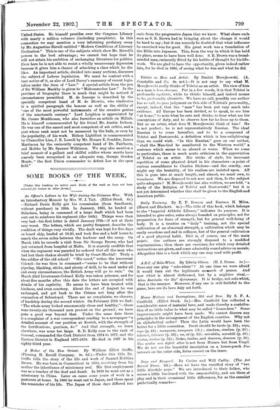SOME BOOKS OF THE WEEK.
[finder this heading we notice such Books of the week as have not been reserved for review in other forms.] An Officer's Letters to his Wife during the Crimean War. With an Introductory Memoir by Mrs. W. J. Tait. (Elliot Stock. 6s.) —Richard Denis Kelly got his commission (from Sandhurst, without purchase) in 1834. In January, 1855, he landed at Balaclava, being in command of a large draft which had been sent out to reinforce his regiment (the 34th). Things were then very bad—his first letter is dated January 17th—if not at their very worst. The letters, which are pretty frequent, describe the condition of things very vividly. The draft was kept for five days on board ship, landed at 10.30, and took five and a half hours to march the seven miles between the harbour and the camp. On March 14th he records a visit from Sir George Brown, who had just returned from hospital at Malta. It is scarcely credible that when the regiment was paraded he ordered that all the men who had lost their shakos should be tried by Court-Martial ! Truly a fine soldier of the old school ! "His creed," writes the irreverent Colonel—he was then in command—" seems to be that without pipeclay, blacking, sticks, and plenty of drill, to be used under all and every circumstances, the British Army will go to ruin." On March 23rd Lieutenant-Colonel Kelly was taken prisoner, and for about five months after this date the letters are occupied with details of his captivity. He seems to have been treated with kindness, and even courtesy. About the end of August he was exchanged, and got back to the Crimea not long after the evacuation of Sebastopol. There are no complaints, we observe, of hardship during the second winter. On February 25th we find : "The whole army looked uncommonly clean and healthy,"—there were twenty-six thousand men present on the ground ; we have gone a good way beyond that. Under the same date there is a complaint of a war correspondent sending to a newspaper "a detailed account of our position at Kertch, with the strength of the fortifications, garrison, &c." And that strength, we learn elsewhere, was none too large. R. D. Kelly rose to the rank of General, commanded the Cork District from 1874 to 1877, and the Eastern District in England 1877-1878. He died in 1897 in his eighty-third year.










































 Previous page
Previous page